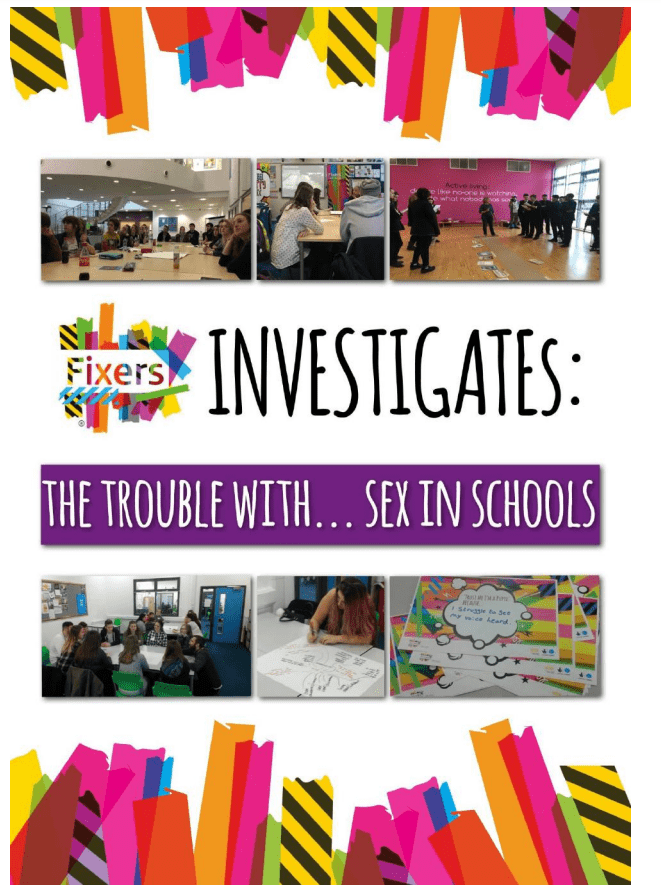Case Study – Rosie, 17, Cardiff
This Fixer was stalked, harassed and assaulted. She ended up leaving school and is now trying to help others. What constitutes bad sexual behaviour? “I think bad sexual behaviour – especially in schools – is when boys feel that they have a right to touch you even when you don’t want to be touched. I’ve had problems with not just boys but girls as well where, you know, they’d forcibly grab you and touch you in intimate places. I think bad sexual behaviour would be even if you say ‘no’ they still carry on with no consent there, especially in a school environment.”
Is it common?
“I think it is common. There’s different levels of it. Even the little things go unnoticed. And they’re just kind of excused by ‘boys will be boys’ or ‘it’s just what happens’ kind of thing.”
Is it just banter?
“It could really affect someone in a way where they have been hurt and they blame themselves and especially when teachers don’t do anything about it you feel like it is kind of all your fault or it is a bit of a joke. But when you’re being touched by someone you don’t want to be that’s, you know, rape or assault.”
What are your experiences?
“Usually it’s just boys. I’ve heard about boys touching girls. That’s just on a regular basis but I think… My worst experience happened with another girl and that was I think kind of swept under the carpet a bit because she had problems and I was only 12 at the time and she touched me in private areas and held me against the wall. Although it was quite serious, it wasn’t dealt with at all and it wasn’t seen as an assault. I don’t know why. I’ve come to terms with it now but at the time I was quite confused because I was quite young, I was quite embarrassed about it.”
Did you speak out?
“Yeah, I spoke out. I spoke out later. At the time, I kind of didn’t know how to tell anyone but I think when I was coming to terms with it and could describe what happened and I was getting counselling then that kind of helped me come to terms with it. Talking to someone in confidence and them being able to give advice back, I was kind of able to get my head around it.”
Are teachers and counsellors helpful?
“I think at the time teachers were the least helpful and counsellors were probably the most helpful. I think because it’s hard to speak out sometimes, I think if you can talk to someone you trust it doesn’t
have to be a teacher because I know teachers are hard to talk to but, you know, even if it’s a helpline or your parents or a friend, someone you can trust, if you get the confidence to do that things can get better and you can sort it out. Whatever has happened can be spoken out about and it can potentially help other people in that situation.”
At what age does sexual behaviour become a problem?
“I think early teens. I think 14 is an age where things kind of… it’s more noticeable at that point. You’re young, you’re figuring out things about yourself as well as other people and it’s just at that age where
boys get this idea about ‘sex’ and ‘girls’ and girls feel that boys have this entitlement… I remember being 14 and having the idea that boys sort of have an entitlement to you and it’s around that young age that’s when it can become a problem.”
Where does the idea of entitlement come from?
“There’s a lot on the internet, especially pornography. I think, you know, because a lot of boys watch that at such a young age and the way… how graphic it can be means boys seem to get the idea that that’s how you treat a girl and that’s what real life is like and then it sort of just spreads and girls get this idea that ‘it’s on the Internet so that must be true’ and it spreads.”
How could sex education help?
“We learnt about the basics of safe sex but we never learnt what is consensual. We don’t learn about sexual harassment or sexual assault, having sex when someone’s drunk… you know, all that never came into conversation. It was all about the human body and that was it. If people learnt from a young age what’s right and what isn’t, there would be an improvement because I think when there are allegations where someone’s been drunk I think people overlook it because it wasn’t really the other person’s fault because she shouldn’t have drunk so much and she didn’t say ‘no’. People have this idea that sexual assaults or rapes only happen within dark alleyways never in another situation and I think that’s a big
issue because rape victims are left to feel like it’s their fault.”




